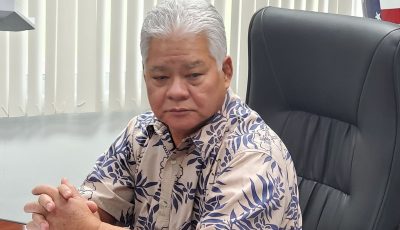MY GLASS CUP
Ocean Elder
For purposes of HOPE (Healthy Oceans & People Empowerment), a mentoring program that serves as a bridge between traditional culture and modern conservation science by incorporating local ocean knowledge with a Western science curriculum, I was asked to serve in the capacity of “Ocean Elder.” The mere mention here of having been bestowed such a title gives me an uneasy feeling: “Ocean Elder,” I say to myself silently over and over again. Yes, I have been over-thinking it like I do most things—I do understand that it is simply a categorization within a grant program and I think the creators of the program were wise in their choice of names for the grouping. The thing is that there is a natural hierarchy and spiritual aspect for islanders in our relationship with elders, of course, but also with the ocean, which I do not fully understand and am reluctant to insert myself as some sort of expert—I, unequivocally, am no such thing. So I hesitated, but eventually accepted the request out of my cultural sense of obligation not to deny my niece (by way of my extended island family) who asked me.
It’s not that I have a problem with being “old,” mind you; in fact, I embrace getting older and am most comfortable living behind a mask of an overgrown white beard to look the part. Still, looking the part and being it are not one in the same—I simply am not old enough in years to be an elder and am much less wise or knowledgeable enough to be an “Ocean Elder,” regardless of whether or not I identify as one. It felt disingenuous to a certain degree and, more importantly, it made me think I was being somewhat “namaiki” (meaning disrespectful or putting myself too high up) to accept the role, but then it occurred to me that those feelings of inadequacy or of not being worthy are directly rooted in my cultural sense of respect for the tried-and-true elders of the ocean (many of whom I grew up admiring and most of whom have already passed on). I had the good fortune of spending much of my early years on or around the ocean in the company of men and women who sustained us solely through their knowledge of our ocean and our lands therein. We lived on our home island of Lukunor, a small atoll in the Mortlock islands without the modern-day amenities of grocery stores, electricity, or running water and relied on the ocean for food. Perhaps what I can bring to this role are tidbits of memories in the form of stories about the people and life from those days or maybe I can help to foster a sense of respect among the participating youth for our ocean and the true elders therein (past and present). If I don’t honor their memory, then who will?
A quick observation about the difference between then and now: When I was young we needed the ocean to survive, but today it seems the ocean needs us in order for it to survive.
This project—by way of an educational collaboration between PSS sixth-graders, NMC ENRO college students, and community elders—offers hope (as the project acronym so aptly states) that future generations will know their part in preserving what ultimately is an islander’s greatest resource for life. Funded by a grant from the Administration of Native Americans, Project HOPE is a free ocean science program uniquely tailored to the needs of Public School sixth-graders. In the long term, this initiative aims to foster interest in conservation careers among CNMI youth with the ultimate goal of developing more local ocean and marine science professionals (https://www.friendsmarianatrench.org/programs-projects/project-hope/).
During my orientation to be a part of this project, one of the other Ocean Elders (an actual elder and coincidentally a college schoolmate of my 81-year-old father) spoke briefly about traditional conservation practices in Palau having been passed down through generations, making the point that ocean conservation is not new. Even though some of the specific ways we go about it today may not be exactly the same as it started, the purpose remains rooted in protecting our oceans and the vast variety of life therein. There are varying schools of thought on ocean conservation between different types of people, of course. Some believe in conserving marine life today for a bigger yield tomorrow—these are those who view the ocean as a resource for life, more in line with traditional practices for subsistence fishermen of old and commercial fishermen today. Others want to conserve for the sake of conserving—these are the hopeless romantics who see value in untouched beauty and nature’s wildlife for spiritual renewal. The truth is that islander customs, practices and general belief systems related to our oceans have elements of both the practical and spiritual—a kind of symbiotic relationship whereby one should exist without the other.
My favorite uncle growing up on Lukunor—my Dad’s cousin, Tailen—and was known to be an incredible fisherman. He was small in stature, but if ever there was an incarnation of what it means to have the heart of a lion he would be it—generally unafraid of anything or anyone. Whereas most fishermen bring home their biggest catch for food, show and/or trade, he was well-known for making a point to eat the biggest catch of the day on the boat or on shore before returning home as a kind of sacrifice to the spirits of the ocean. “Angai ena e likap pwe sipwe apwapwai naosh anu set” (loosely translated: “Take the biggest on so we can make the ocean spirits happy”), he would proudly proclaim. He was also a bit of a show-off and liked people talking about the sizes of fish he wouldn’t bring home—I’m pretty sure my 10-year-old son (despite never having met him) gets that boastful trait from him. My Uncle Tai passed away about a year ago now…God rest him.
Some of the most traumatic events in my life (some of which I can see like a scented video in my memory) took place in or on the ocean. Equally vivid are the colorful images of underwater life such it was for me as a kid living on an isolated atoll in ’70s and ’80s—colors beyond even what the imagination could see. I simply could never have imagined dead reefs and such sparse fish supplies like I see around Saipan today and that some, if not all of it, is due to human carelessness is a little much to take. I am grateful for Friends of the Marianas Trench and Project HOPE for their part in doing something about it (and for letting me have a small part with them).
***
Jim Rayphand is a former executive director of the Northern Marianas Protection and Advocacy Systems Inc. and recently ventured into a startup fishing business.



























